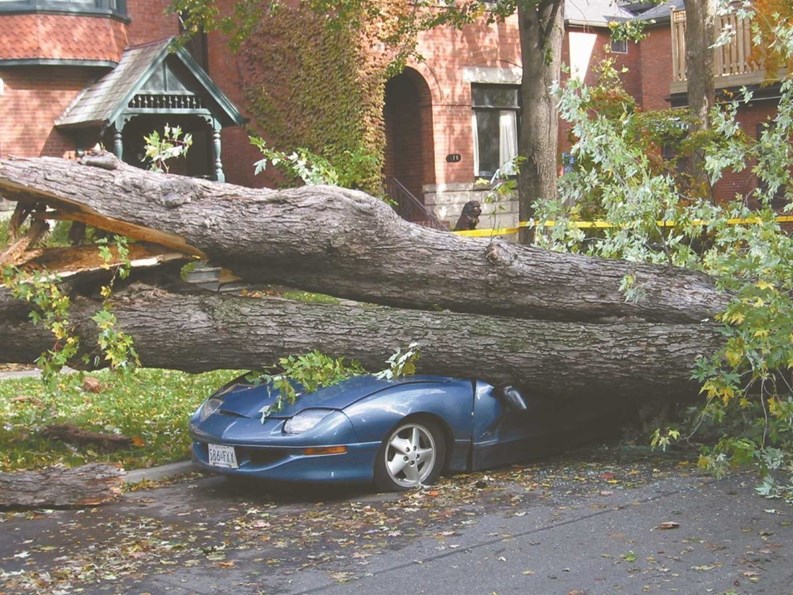The importance of insuring one’s personal property is rarely grounds for debate, as people regularly make out checks in varying sums for policies they hope they will never have to make use of. And in theory, the concept is simple: You buy insurance, something is damaged, insurance pays for the damage.
When it comes to those who dwell in condo buildings, however, what at first seems simple can grow quite complex.
Imagine this: A fire tears through your building, burning it to the ground, all its contents destroyed. Or a blizzard brings with it such heavy winds and rain that your roof cracks under the weight and water damages your antique couch beyond repair. You’ve received a copy of your building’s insurance policy (whether or not you’ve made it through the entire document is another story) and you think you’re covered. Right? Not quite.
Two types of insurance come into play here—building insurance, and homeowner’s insurance. Both are necessary in order to ensure preservation of your home and property, both are subject to a host of different conditions, and both place the burden of responsibility on unit owners, property managers, homeowner’s associations and insurance agents alike.
“Many homeowners think their building’s master policy covers all of their possessions,” says Jack Connolly, of Wedgwood-Crane & Connolly Insurance Agency in Somerville, Massachusetts. “It does not. Your personal property is your personal responsibility. You have to have your own coverage—and you have to understand it.”
Building vs. Homeowner Insurance
“Unfortunately, there is a tenant mentality, wherein unit owners think that they are tenants and that the association is the landlord and they will be taken care of,” says Bernie Gitlin of Global Insurance Network Inc. in Needham, Massachusetts. “That couldn’t be further from the truth.”
Building insurance covers just that—the building. This means the physical structure, as well as generally the building’s common areas, including stairwells, pools, garages and the like. Homeowner’s insurance provides coverage for the contents of individual units, as well as for any parts of the apartment that the building’s bylaws specify the owners as being responsible for. Confusion can arise, however, when it comes to defining what is building property versus what is personal property.
“The most common misconception among unit owners around here is that they believe because they own a unit they should insure the insides,” Gitlin says. “They look at the master deed and say, ‘Because I’m the owner, I’m responsible for the insides.’ Because of this, owners often buy much more insurance than is required.
“Usually the association is responsible for the inside of a unit. In this part of the country, bathroom fixtures, cabinets, etc., are considered part of the building, not personal property.”
A good way to differentiate is to look at personal property in terms of content; rather, an owner’s “stuff.” The unit owner is responsible for insuring his or her own furniture, furnishings and possessions.
“An individual unit owner’s insurance policy is in place to protect an individual unit’s owner’s personal content—such as furniture, computers, stereos, fine art and the like,” says Connolly. “The building’s insurance policy covers none of this—the only way to protect such items are with an owner’s insurance policy.”
Breaking Down the Numbers
“Included in a building’s policy bylaws is an insurance article, which defines what the master policy will cover,” says Jamie E. Trussell, vice president of HUB International New England in Newburyport, Massachusetts.
“Property insurance is written with a deductible, meaning that the insurance will not become effective until the cost to repair or replace the damage exceeds the amount of the deductible. The amount of the deductible could vary from $1,000 to possibly $25,000, depending on the size of the community, the loss experience of its insurance as well as the discretion of the board.”
The deductible for a personal policy could range from $1,000 to $2,500, depending on how big a policy is purchased, according to Connolly. Due to lower deductibles, claims may be settled far more quickly under individual homeowner’s policies.
“It is definitely advisable for every owner to have a personal insurance policy that they review with their insurance agents,” Connolly says. “Homeowner’s policies are very comprehensive, also including a liability policy that covers individuals in the event that they lose use of a living area. Homeowner’s policies refer directly to the person, and agents dealing with them deal directly with the owner, as opposed to an association representative.”
When Disaster Strikes
To determine what a building’s master policy covers regarding damage to the building, one must first turn back to the bylaws and insurance article, according to Trussell. The property insurance section of the policy insures the building against events such as fires, windstorms, vandalism, theft, broken pipes, etc.
“Generally it covers any event that is sudden and accidental, with certain exclusions,” says Trussell.
One such exclusion would come in the event of an earthquake, a natural disaster not covered by master policies.
“Here in New England, earthquakes are not a major problem, and for that reason insuring against them is not very expensive,” says Connolly. “And they are a risk. I definitely advise homeowners to purchase earthquake insurance. It’s going to cost maybe $60-$100 a year, and even thought it’s not something we often think about here, it’s a risk that could do real damage. And that’s really what we all buy insurance for anyway— things we can’t predict.”
Again, a personal homeowner’s insurance policy is key to making sure your possessions are safe.
“It is common practice that if an association has deductibles and loss occurs within a unit owner’s area, as opposed to in a common area of a building, the owner is responsible, subject to any clauses in the deed,” says Gitlin.
Well, Am I Covered?
To determine the appropriate amount of homeowner’s insurance to carry, the owner should discuss it with the agent who is designing the policy with them, according to Trussell.
“Such factors as size of the unit, number of inhabitants for clothing, quality of the furniture and furnishings as well as the number and value of special items such as computers and antiques affect the amount,” says Trussell. “Personal property should be written on a 'replacement cost' basis to avoid depreciation being a factor in the settlement of a loss.”
Connolly suggests that all owners do a “room-by-room inventory” to try to calculate replacement costs.
“In an event, such as a fire, in which everything has been destroyed, it is important to have some account of what was there and what it was worth,” Connolly says. “Today, with the ease of digital pictures—or better yet, video—everyone should have an account of their possessions stored somewhere else. I can’t tell you how many times I’ve seen people, traumatized by an event that has left them with nothing, unable to even recall what was in the rooms that were destroyed.”
Communication is Key
Unit owners are entitled to and should have knowledge of the building insurance policy that is in place to protect them and their home. According to Trussell, some property managers provide letters for unit owners explaining what the master policy covers and what needs to be covered under the owner’s homeowner’s policy.
“Boards or property managers should have this information available and distribute it periodically for the owners’ benefit,” Trussell says. “If not, then they should instruct the owner on how to contact the association’s insurance source directly to get this information. Without it, the owner and the agent writing his or her policy won’t know how to best set up their policy.”
Communication is the key, Gitlin says, and it is important to work with a personal insurance agent who will go over the details with you and make sure you understand them.
“If your insurance agent doesn’t ask you for a copy of the master documents, then you need a new agent,” says Gitlin. “A typical insurance document is 100 pages long–to think that an owner will read the whole thing is unrealistic. To think that you have insurance agents as tenants in a building is unrealistic.”
Connolly agrees: “It is wise to get a copy of the building policy detailing coverage, and to always consult with your own agent about the building’s master policy, or call the agent handling the master policy to help you understand the details.”
The Yearly Review
Insurance policies are automatically renewed each year, according to Connolly, though not much will change unless there are requests to do so. For that reason, individual owners and associations should also annually review and make adjustments.
“Talk to your insurance agent every year,” says Connolly. “And make him aware of significant changes to your lifestyle.”
“Marriage, additional persons living in the unit, new pieces of property–somebody has to account for the things that have changed over the past year, and the person writing the policy isn’t going to know if you don’t tell them.”
This encompasses improvements made to a unit as well.
“As long as you get the permits to do so, you are generally allowed to add on to or improve your unit, be it in the form of a solid gold staircase, a new bathroom, etc,” says Connolly. “However, once you’ve made an investment in your unit, you are responsible for insuring that investment—you pay for it yourself because you made it yourself.”
Conversely, improvements made to the overall building are to factor into adjustments made to the building policy, and it is once again the responsibility of the board or managing agent to make sure that the updated information is available to owners, and to make sure they understand what it means for them and what they have bought into.
“It is the responsibility of the association to reinforce regulations and responsibilities of unit owners on a regular basis,” Gitlin says.
Relying on Your Agent
Massachusetts does not currently have any law requiring homeowner’s insurance. Those under a lease agreement may be required to have a policy, as may those who have a bank loan. Ultimately, though, an individual policy is a matter of choice—and a very important one.
“It may not be state-mandated, but having your own insurance coverage is very important,” says Connolly. “It is the only way to ensure you’ll be able to rebuild your life in the event that you lose everything.”
The best way to go about making sure you understand your building’s policy and the individual insurance that is right for you is to call your independent insurance agent, according to Connolly. While it is ultimately up to you, the owner, to make sure you have adequate coverage for your property and possessions, it is your agent’s responsibility to make sure your policy makes sense to you.
“Call up your agent,” says Connolly. “And have him discuss the policies with you. Keep a detailed copy of your own policy, and one of the building’s, and make sure you go over them with your agent and understand them. It’s the only way you can be sure you know what you’ve paid into, and how covered you are in any event.”
Kim Cameron is a freelance writer for New England Condominium magazine.







Leave a Comment